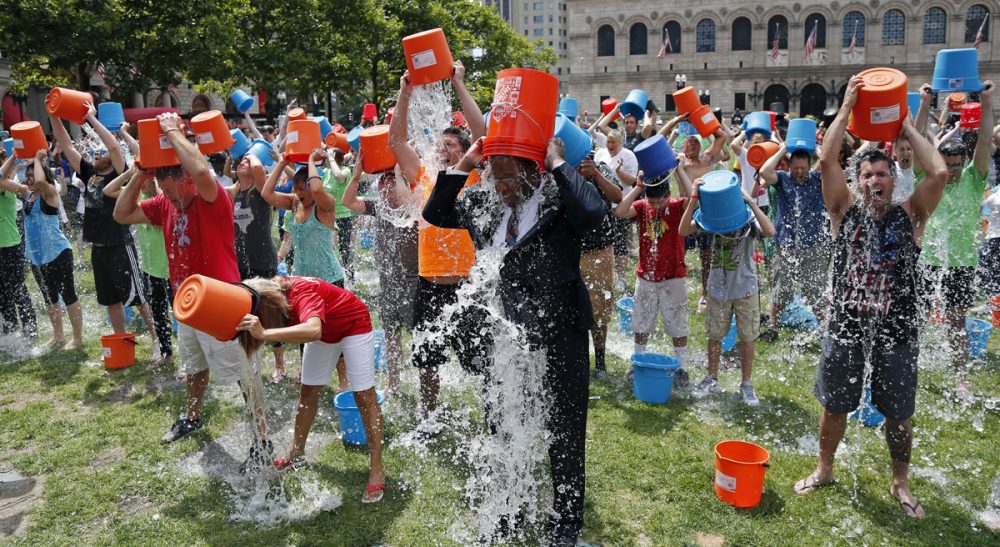Advertisement
Two Views On The Ice Bucket Challenge

A note from the editor: Today, we offer back-to-back opinions on the Ice Bucket Challenge. For the unitiated (and still dry), the challenge intends to raise money and awareness for Amyotrophic Lateral Sclerosis, or ALS. Participants are dared to dump a bucket of ice water over their heads and post a video of the feat online, or make a donation to support ALS research — and then nominate a friend to do the same. Below, Eric Hansson writes in support of the challenge. Up first, Heena Santry writes against it.
ALS is an awful disease.
As a surgeon who has performed tracheostomies on ALS patients who have been robbed of the ability to breathe, I have experienced the disquiet of wondering whether I am helping them or prolonging their suffering as they are progressively trapped, mental faculties fully intact, in a non-functioning body.
At worst, the Ice Bucket Challenge is nothing more than “me too-ism,” blindly hopping on to the latest viral craze without understanding why it is a good deed.
Like many awful diseases, ALS deserves to be the subject of research, inquiry and the quest for treatments and a cure. For this reason, I feel good about the uptick in donations for ALS research sparked by the Ice Bucket Challenge. Unfortunately, too few of those who have accepted the challenge include anything meaningful about the disease or about how participating might help ALS patients in their online posts about their ice bucket experience. This reduces their participation to, at best, the appearance of altruism wrapped up in the aura of being tough enough to endure a very cold dousing. At worst, the Ice Bucket Challenge is nothing more than “me too-ism,” blindly hopping on to the latest viral craze without understanding why it is a good deed.
In the era of social media, we have more opportunities than ever to support worthy causes, from rare diseases and prevalent cancers to vulnerable children and abandoned pets. Sometimes, we donate because someone we know is running, cycling or building for a cause. Sometimes, the cause holds special meaning to us. Perhaps we lost someone to the rare disease, or our own good fortune inspires us to help others who don’t share it.
Although donations to ALS charities are up, I am not convinced that awareness of the disease, which is the other object of the challenge, is. I wonder how many know what ALS stands for, or that it is also known as Lou Gehrig’s Disease. How many know that the disease causes progressive loss of motor control of bodily functions? How many know why a cure remains elusive?
However you ascribe meaning to the act of giving, it should be more than just jumping on a bandwagon. That is why this silly challenge makes me sad for humanity. Are we challenging each other to act charitably because it's the right thing to do, or because everyone is doing it?
Twitter: @surgeoninheels
Eric Hansson is a Shrewsbury native and a graduate student in international affairs and economics. Twitter: @Call_me_Eric

The Ice Bucket Challenge, started by the family of former Boston College pitcher and Beverly, Mass., resident Pete Frates, who was diagnosed with ALS in 2012, has gone viral. And as the videos of soaked participants have multiplied, the challenge’s detractors have chimed in. Jezebel blogger Kara Brown questioned how “raising awareness” about ALS helps people suffering from it. Brian M. Carney expressed skepticism in the Wall Street Journal about how suffering a cold bucket of water furthers ALS research. “What’s the point?” the detractors seem to ask, “besides posting a wet selfie and enjoying a feel-good moment that you’ve ‘done something’?”
Raising awareness about a rare disease like ALS through stunts like the Ice Bucket Challenge does matter. Before a friend nominated me, I had heard of ALS, but it was the last thing on my mind. If I’m not alone, however, then the challenge inspired many others to learn more about ALS, as I did through links that participants shared in their posts.
At the end of the day, if more people are talking about ALS and raising money to research a cure, who cares why people drench themselves?
While the Ice Bucket Challenge does not explicitly ask the participant to donate, that does not mean it hasn’t helped fund research. Since July 29, donors have given $5.5 million to the ALS Association. During the same period last year, the association took in $32,000. These donations are coming in because people’s friends, neighbors and co-workers took the challenge and nominated others to do the same. I’m sure some of the challenge’s drenched participants do not donate, but the numbers suggest that many do.
I concede that pouring a bucket of ice water over your head will not cure ALS. However, the attention doing so brings to the disease does make a difference. People might not have heard of ALS before the ice bucket challenge, but they know about it now. At the end of the day, if more people are talking about ALS and raising money to research a cure, who cares why people drench themselves?
Related: